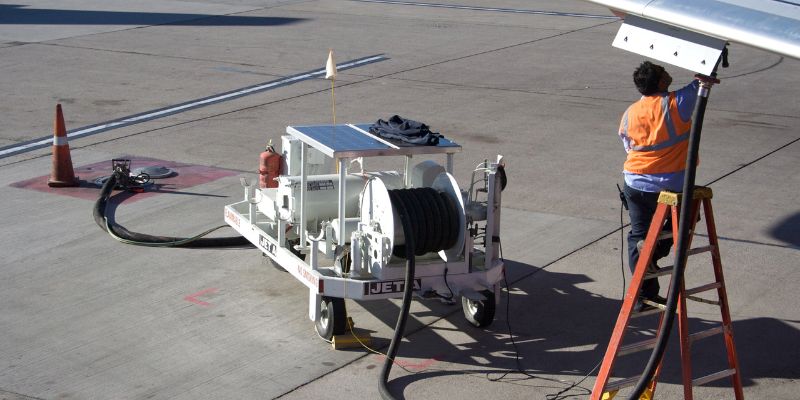Aircraft refueling in India is handled by major oil companies under DGCA oversight. Hindustan Petroleum (HPCL) for example supplies Jet A-1 fuel at 35 airports nationwide. The network covers all major international airports, with contract fuel companies (into-plane handlers) at Delhi, Mumbai, Bangalore and Hyderabad. These suppliers comply with Indian and international fuel specifications (ASTM D1655, DEFSTAN).

Continuum Aviation fuel management services in India leverage this infrastructure for client benefit. We maintain contracts with authorized suppliers to secure competitive fuel pricing. Before the flight, our dispatchers calculate fuel requirements based on route and aircraft performance, optimizing load to balance weight and reserve needs. We submit fueling requests to the relevant airline or airport fuelling ops; on arrival, our agents track fuel uplifts to confirm the correct grade and quantity is dispensed (each refueling is quality-tested by HPCL’s protocols. Because DGCA requires strict fuel quality controls, Continuum also performs random sampling when requested, ensuring fuel meets specification. By coordinating payment through our accounts (via major oil and card services), and by managing multiple fuel stops efficiently, Continuum provides seamless fuel logistics so operators can focus on flying.
Major suppliers include Bharat Petroleum (Air BP), Hindustan Petroleum, Indian Oil, Shell and Total. At some airports, concessionaire companies conduct into-plane fueling under contract.
When booking with Continuum, we notify the fuel supplier of your ETD/ETA. The handling agent at each airport coordinates a fueling truck at ramp. For example, in Bangalore HPCL operates hydrant refueling for large jets.
Jet A-1 is standard for turbine engines in India. (Avgas 100LL is available at limited GA airports.) Continuum specifies the grade based on aircraft needs.
Yes, all civil airport refueling is under DGCA regulation. Suppliers perform quality tests (e.g. water check) before each uplift. Continuum can request copies of fuel release certificates.
Prices vary daily. Companies publish daily rates (HPCL posts “ATF price for the day” online. Continuum tracks prices to advise on cost-effective fueling stops.
Generally, fuel is paid after uplift via invoice or advance deposit. For tight schedules, Continuum can arrange a fuel credit card through our partners to avoid delays.
There is no special fuel permit; your aircraft’s landing permit covers all ground services including fueling. Continuum handles fuel requests under the same permit.
Rare, but if an airport runs short (e.g. remote airfields), Continuum plans alternates. We check with local handlers 24h in advance. If needed, we’ll pump extra fuel at a preceding airport or use tanker trucks (if allowed by DGCA).
Continuum advises minimal stops. We calculate maximum payload-range. If a stop is needed, we pick a location with lower fuel cost if possible. We also consider overfly zone charges when planning stops.
Yes, fuel trucks and operations are insured under the supplier’s and handler’s coverage. Continuum’s insurance policy is in place for any on-ground incidents.
Standard landing/parking charges include a small fuel upland fee. Continuum includes these in our trip quote. There is no extra “service fee” for using into-plane.
No, we arrange fueling through existing suppliers. However, we do manage the fuel operation closely: trucks arrive with our staff oversight to ensure no mix-ups
Specialising in both international and domestic aircrafts, we seamlessly manage arrivals, departures, and all aspects of ground support.
India
Sri Lanka
Nepal
Bhutan
Maldives
Bangladesh
Operations Email :
[email protected]
General Email :
[email protected]